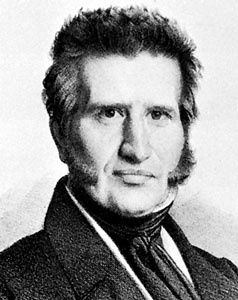Dahlmann, Friedrich
German historian
born May 13, 1785, Wismar, Swedish-held city in Mecklenburg 【Germany】
died Dec. 5, 1860, Bonn
 prominent liberal historian and advocate of German unification along Kleindeutsch (“Little German,” or anti-Austrian) lines, who played a major role in creating the draft constitution of 1848 that attempted unsuccessfully to unite Germany as a constitutional monarchy.
prominent liberal historian and advocate of German unification along Kleindeutsch (“Little German,” or anti-Austrian) lines, who played a major role in creating the draft constitution of 1848 that attempted unsuccessfully to unite Germany as a constitutional monarchy.Dahlmann was appointed professor of history at the University of Kiel in Schleswig (1812), and in 1829 he moved to the University of Göttingen, where he helped draft the liberal Hanoverian constitution of 1833. When King Ernest Augustus repudiated the Hanover constitution in 1837, Dahlmann led a famous protest of seven Göttingen professors that aroused great popular sympathy in Germany. Dismissed and banished from Hanover, he spent some years in Leipzig and Jena. He was appointed to the faculty at the University of Bonn by Frederick William IV of Prussia in 1842, and there he wrote several works in which he expressed his preference for the British form of government.
At the Frankfurt convention during the Revolution of 1848, his ideas were incorporated into the Declaration of Fundamental Rights, a draft constitution envisaging a constitutional monarchy under Prussian leadership, freedom of speech and religion, and equality before the law. When the Frankfurt assembly elected Frederick William IV emperor of Germany, Dahlmann was appointed a member of the deputation traveling to Berlin to offer the crown to the Prussian sovereign. Frederick William refused, however, and Dahlmann resigned from the national assembly. In June 1849 he nonetheless supported the Gotha Conference and sat in the Prussian (1849–50) and Union (1850) parliaments, both much curtailed and more conservative than the Frankfurt assembly. Afterward, he retired from political life.
- Frueh, Al
- Fruehauf Trailer Corporation
- fruit
- fruit bat
- fruit farming
- fruit fly
- fruit processing
- fruit spot
- fruitworm beetle
- Frumentius, Saint
- Frundsberg, Georg von
- Frunze, Mikhail Vasilyevich
- Fry, Christopher
- Fry, Elizabeth
- Frye, Northrop
- frying
- Fry, Maxwell
- Fry, Roger
- Frère-Orban, Walthère
- Fréchet, Maurice
- Fréchette, Louis-Honoré
- Frédéric-Alfred-Pierre, comte de Falloux
- Frédéric-Alfred-Pierre Falloux, comte de
- Frédéric and Irène Joliot-Curie
- Frédéric-Auguste Bartholdi